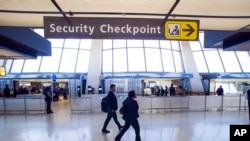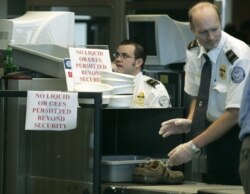A U.S. journalist has filed a civil rights complaint against the Department of Homeland Security after a Customs and Border Protection agent delayed his re-entry until he admitted to writing “propaganda.”
The incident occurred at Dulles International Airport outside Washington, when Defense One writer and editor Ben Watson was returning from a trip to Denmark.
Defense One is an online journal owned by Atlantic Media that covers the defense industry.
During re-entry, Watson handed over his passport and was asked a series of standard questions: "Do you have anything to declare?" "Did you bring any meat or cheese with you?"
Watson was also asked his profession.
"Journalism," he replied.
'You write propaganda, right?'
According to Watson’s account, the agent continued his questioning.
“So, you write propaganda, right?”
“No,” Watson replied.
“You’re a journalist?”
"Yes," Watson said.
“You write propaganda, right?”
“No. I am in journalism covering national security and homeland security, and with many of the same skills I used in the U.S. Army as a public affairs officer," Watson answered. "Some would argue that’s propaganda.”
"You’re a journalist?” the agent repeated.
"Yes," Watson, replied again.
“You write propaganda, right?” the agent asked again.
'Stunning, not normal'
Watson was repeatedly asked the same question for a period of time, which elicited the same response from Watson.
Watson said he agreed to say he wrote propaganda to "expedite the conversation." At that point, he was handed back his passport.
In an email to VOA, Watson called the incident “stunning, and certainly not normal.”
“It was also irrelevant to the matter of re-entry into the U.S.,” he said. “And unfortunately, we've learned more fully in the days since, it is seemingly part of a pattern at U.S. Customs. We're pleased DHS and CBP officials say they're looking into the allegations.”
In a statement to VOA, CBP called the situation an “allegation about an officer’s alleged inappropriate conduct at Washington Dulles International Airport.” The statement said CBP is exploring what precisely happened.
There have been other reports alleging harassment of journalists at the U.S. border.
In June, Seth Harp of The Intercept was questioned for hours and had his personal belongings, including his mobile phone, searched by CBP agents.
In February, BuzzFeed journalist David Mack said he was grilled by agents about a specific story.
In August, British journalist James Dyer claimed to have been harassed by a CBP agent who called his work “fake news” and asked if he was “spreading lies to the American people.”






